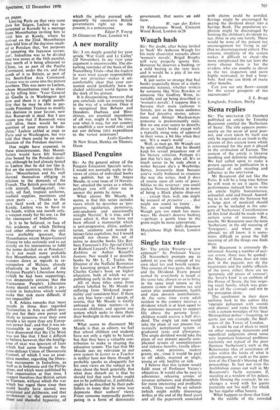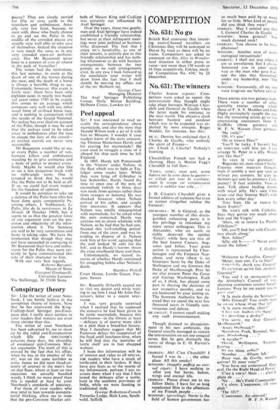Siena replies
Sir: The SPECTATOR (31 October) published an article by Timothy
Beaumont entitled the 'Barbarians of Siena'. The title appears promi- nently on the cover of your jour- nal, and even taken by itself can only be regarded as an insult to the citizens of this ancient town which is renowned for the part it played in the civilisation of Europe. The content of the article is likewise
insulting and definitely misleading. We feel called upon to make a protest against its publication in a periodical of such standing and influence as the SPECTATOR.
Mr Beaumont did not like the Palio. It will be a long time before he will want to see it again. The performance induced him to write an article highly humanitarian, colourful, acid and biased. Accord- ing to it, not only the Siennese but a large part of mankind should come to be included in the cate- gory of 'barbarians'. Considerations of this kind should be made with a certain sense of measure. But, maybe. Mr Beaumont uses the term `barbarians' in the old meaning of 'foreigners', and when one is abroad, we all know, it is some-- times difficult to grasp the full meaning of all the things one finds there.
Mr Beaumont is extremely ill- informed. Among a number of seri- ous errors, three may be quoted: the Mayor of Siena does not take part in the pageant, nor do the magistrates and the public officials of the town, either; there are no 'genuinely old pieces of armour: the 'lover's knot' is an emblem of the House of Savoy, the late reign-
ing royal family, which was gran- ted to all the contrade and not to the porcupine alone.
The carabinieri in their dress uniforni look to the author like `operatic policemen with swords and plumes' and make him think with a certain nostalgia of his 'dear Metropolitan police'—forgetting, to quote just one example, the Beef- eaters of the Tower of London.
It would be out of place to insist on other sweeping statements and superficial judgments about some very important historical problems (certainly not typical of the poor Siennese 'barbarians'), such as the Renaissance idea of acceptance of rules within the limits of what is advantageous, or such as the ques- tion of the Church's blessing of the proceedings. In fact not even the Archbishop comes out well in Mr Beaumont's facile sarcasms if, standing at a window of his palace,
while blessing the contrade, he ex- changes a word with his guests (certainly not 'his staff, for which he has regular office hours).
What happens to those that faint in the middle of the crowded piazza? They are simply carried for fifty or sixty yards to the stretchers and ambulances. Actu- ally very few faint, because, to start with, those who freely choose to go and see the Palio in the middle of the crowded piazza are usually very well able to take caw of themselves. Indeed the situation is very much the same as in any very crowded open-air perform- ance. Has Mr Beaumont never been to a concert of tors de chasse in the park of Versailles?
The writer had the misfortune, this last summer, to assist at the death of one of the horses during the race; and the death of a horse is always a horrible thing to see. Fortunately, however, this event is fairly rare: there have been only eighteen cases in nearly two hund- red years (since 1783 to be exact); this comes to an average which compares very well with any other usual form of civilised horse race, and is nothing in comparison with the results of the Grand National. No jockey has ever died on account of the Palio, though it may be said that the jockeys tend to be taken away in ambulances after the race to escape the fury of the crowd— as excited crowds are never very reasonable.
Mr Beaumont would like to see, at every Palio, a number of vets, humane killers and ambulances standing by to give assistance and a body of police to protect every- body. Maybe he would also like to see a less dangerous track with no right-angle turns. One is tempted to. think that he would like the Palio not to be held at all. If so, we could feel every respect for his freedom of opinion.
It would be pointless to take up a defence of the Palio here (this has been done quite competently by, among others, J. Noblecourt, Le Polio, fete de la survivance, in Le Monde (8 October 1969), but it seems to us that. the greatest force of any argument rests on the pre- cision and objectivity of the infor- mation about it. The Siennese are said to be very contentious and hasty in taking sides. We have the impression that though they may not have succeeded in conveying to Mr Beaumont their love and enthu- siasm for the Palio, they seem cer- tainly to have communicated this side of their character to him.
With our very best regards, Roberto Barzanti, Mayor of Siena Giovanni Grottanelli, University Lecturer Via Stalloreggi, 34 53100 Siena











































 Previous page
Previous page